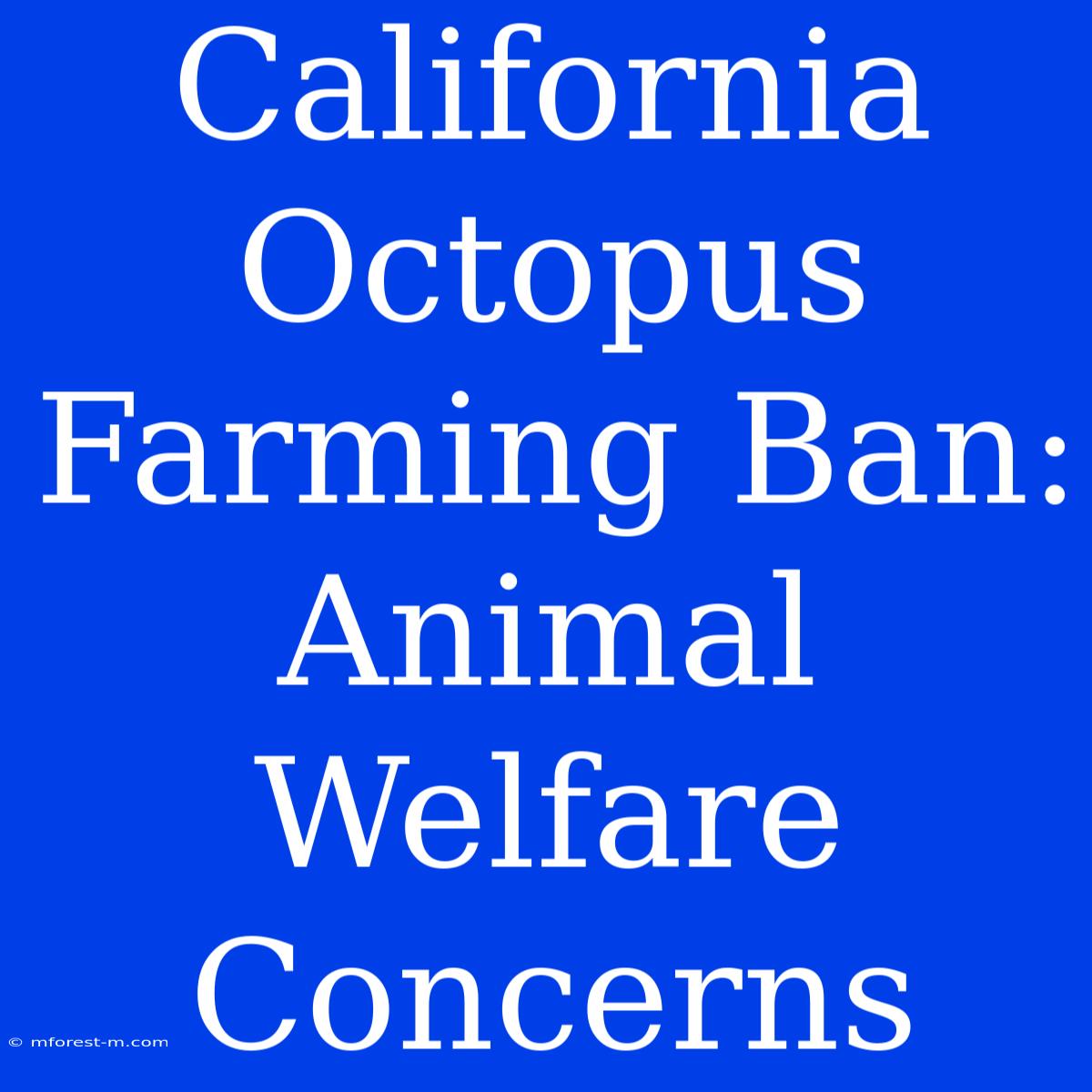California Octopus Farming Ban: Animal Welfare Concerns
Is octopus farming ethical? This question has sparked a heated debate, leading California to become the first state in the US to ban the practice. Editor Note: This article explores the ethical implications of octopus farming, specifically focusing on the animal welfare concerns that drove the ban in California.
This ban, while controversial, underscores the growing awareness of the complex ethical issues surrounding animal agriculture, particularly in the case of intelligent and sensitive creatures like octopuses.
Why is this topic important? Octopus farming is a relatively new industry, but concerns regarding its potential impact on animal welfare have been rising. Understanding the ethical considerations surrounding this industry is crucial for navigating the future of seafood production and ensuring the responsible treatment of all animals.
This analysis explores the critical aspects of the California octopus farming ban, drawing upon scientific research, industry perspectives, and ethical arguments to provide a comprehensive understanding of the complex issue.
Key Takeaways
| Aspect | Description |
|---|---|
| Animal Sentience and Intelligence | Octopuses are highly intelligent and sentient beings, capable of complex problem-solving, learning, and experiencing pain and distress. |
| Confined Environments | Farming environments often restrict octopuses' natural behaviors, such as exploring, hunting, and interacting with their environment. This can lead to stress, anxiety, and behavioral abnormalities. |
| Ethical Considerations | Concerns arise regarding the ethical implications of confining and raising these sentient creatures for food, especially considering their intelligence and capacity for suffering. The ban in California reflects a shift in thinking towards recognizing animal welfare needs. |
The Octopus Farming Debate
Animal Sentience and Intelligence:
The debate around octopus farming hinges on the recognition of their unique intelligence and sentience. Octopuses exhibit remarkable cognitive abilities, including problem-solving, tool use, and even long-term memory. They display complex social interactions and demonstrate the capacity to experience pain and distress.
Confined Environments:
The confined environment of octopus farms significantly impacts their well-being. These animals require complex, stimulating environments to thrive. However, farming often restricts their movement, access to natural prey, and opportunities for social interaction. This can result in stress, anxiety, and behavioral abnormalities.
Ethical Considerations:
The ethical implications of octopus farming are highly debated. Critics argue that raising these intelligent and sensitive creatures for food raises serious concerns about animal welfare, akin to the ethical challenges surrounding other forms of intensive animal agriculture.
The California ban reflects a growing awareness of these ethical concerns and the need for stricter regulations surrounding the treatment of animals in agricultural settings.
A Deeper Look at Octopus Farming
Confined Environments and Stress
- Facets:
- Restricted Movement: Octopuses are naturally active and require ample space for exploration and foraging. Farming environments often restrict their movement, leading to boredom and frustration.
- Lack of Environmental Enrichment: The limited stimulation in farm settings can cause stress, anxiety, and depression in octopuses.
- Behavioral Abnormalities: Stressful conditions can lead to repetitive behaviors, such as swaying or tank-rubbing, which are indicative of poor animal welfare.
- Summary: This combination of factors creates a significant risk of negative welfare outcomes for octopuses raised in farm settings, emphasizing the need for alternative solutions.
Ethical Perspectives
- Facets:
- Utilitarianism: This ethical framework focuses on maximizing well-being and minimizing suffering. Critics argue that octopus farming fails to consider the animals' capacity for suffering and prioritizes human benefit over their well-being.
- Animal Rights: This perspective emphasizes the inherent rights of all animals, including the right to live free from exploitation. Animal rights advocates believe that farming octopuses violates their fundamental rights.
- Environmental Impact: Octopus farming can have negative environmental impacts, such as pollution and the depletion of wild fish stocks used as feed. This adds another layer of ethical complexity to the issue.
- Summary: While ethical perspectives vary, the general consensus is that raising intelligent and sensitive creatures in confinement for food raises serious concerns about animal welfare.
FAQ: Octopus Farming and Animal Welfare
Q: What are the alternative options to octopus farming?
A: Promoting sustainable wild-caught fisheries, exploring plant-based alternatives, or investing in innovative food production methods are potential alternatives.
Q: Does the California ban affect the entire US?
A: The California ban only applies within the state. Other states may follow suit, but this decision does not have national implications at this time.
Q: Is octopus farming common?
A: Octopus farming is still a relatively new industry. However, its potential growth, coupled with growing concerns about animal welfare, has sparked this critical debate.
Q: What are the next steps in the octopus farming debate?
**A: ** Further research on octopus behavior and welfare in farm settings, the development of ethical farming practices, and ongoing public discussion are all crucial steps moving forward.
Tips for Consumers
Here are some tips for making informed choices about octopus consumption:
- Check for Certified Sustainable Seafood: Look for labels from reputable organizations, such as the Marine Stewardship Council (MSC), which promote responsible fishing practices.
- Choose Alternatives: Explore other sustainable seafood options, such as wild-caught shellfish or plant-based protein sources.
- Advocate for Change: Support organizations working to promote animal welfare and ethical food production.
Summary: Navigating the Octopus Farming Debate
The California octopus farming ban signifies a growing awareness of the ethical implications of raising intelligent and sentient creatures in confined environments. This decision highlights the need for a nuanced approach to food production, one that prioritizes animal welfare and sustainability. Moving forward, continued research, public dialogue, and responsible consumer choices are critical to ensuring the ethical treatment of all animals in the food system.
Closing Message: The debate surrounding octopus farming is a complex one, and it is crucial to consider the unique intelligence and sentience of these creatures when assessing the ethical implications of this industry. By engaging in informed discussions and supporting responsible choices, we can help shape a future where animal welfare is prioritized and sustainable solutions are prioritized.

